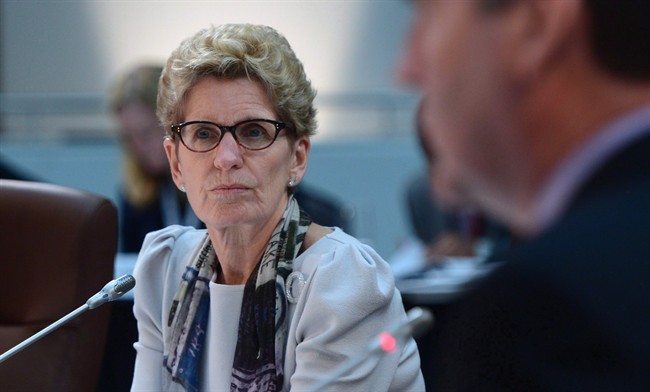TORONTO – U.S. political leaders are showing a better-than-expected understanding of how important trade with Canada is to the health of the American auto sector, Ontario Premier Kathleen Wynne said Friday.

Wynne, who met with several auto industry leaders in Toronto, said her government has been lobbying U.S. politicians to make sure they understand how much American auto sector jobs depend on an unfettered northern border.
That message is getting through, she said.
“There is a deeper understanding of how interconnected we are than we might have expected,” she said.
READ MORE: General Motors moving more than 600 jobs in Ontario to Mexico for cheaper labour: union
Ontario Economic Development Minister Brad Duguid echoed her statement, saying he was also a little surprised at U.S. leaders’ level knowledge about trade with Canada – despite “this perception that… Americans don’t know as much about Canada as we know about the U.S.”
“They are very aware that Ontario, in particular, and Canada is, for the most part, their number one international customer,” he said. “We’re crucial to their economic vitality and we’re crucial to jobs in the U.S.”
Duguid said nine million U.S. jobs rely on an unfettered border with Canada.
However, Duguid said the provincial government is “very alive to the risks” Ontario’s auto sector is facing from upcoming discussions about renegotiating the North American Free Trade Agreement (NAFTA), “speculation about a border adjustment tax,” and Buy American policies in U.S. states.
READ MORE: Canadian automakers concerned about Donald Trump: innovation minister
Neither Wynne nor Duguid explicitly named U.S. President Donald Trump in their remarks, but spoke of the protectionism associated with him.
“Obviously, there is uncertainty,” said Wynne. “You know that as we all operate in this new reality, with the discussions that are going on south of the border, that we in Ontario need to be having a very robust conversation here with our partners.”
Duguid said he expects that uncertainty to last a year or two.
Despite that, Wynne remarked on the optimism of the Ontario auto sector leaders she spoke to.
READ MORE: Why contract talks with the ‘Detroit Three’ automakers are so critical for Canada
“In the past five years Ontario has produced more cars than any other province or state in North America,” she said. “Almost 15 per cent of all car production across the continent happens right here.”
However, Wynne said the province’s economic success depends on a strong business relationships with the U.S.
“In Ontario, more than 100,000 people are dependent on, in one way or another, the auto sector for their livelihood,” she said.
Magna CEO Donald Walker said the discussion was a candid one about important issues.
READ MORE: Ontario and Michigan sign deal calling for more integration of auto sectors
“From a Canadian perspective, we’ve just got to make sure that we have whatever discussions we need to have with the U.S. to make sure we’re not going to be in an uncompetitive position,” he said.
Walker said he’d like to see Canada maintain a trilateral agreement with U.S. and Mexico, as having access to low-cost labour makes the North American market more competitive.
Unifor National President Jerry Dias said the meeting was productive. He said he welcomes the renegotiation of NAFTA, and said changes to the trade agreement are needed.
“There is no question the fact a Mexican autoworker can’t buy a car that he builds, or she builds, is ridiculous, so there has to be a change in labour standards,” he said. “But there also has to be a stop to the straight exodus of our jobs going to Mexico.”



Comments